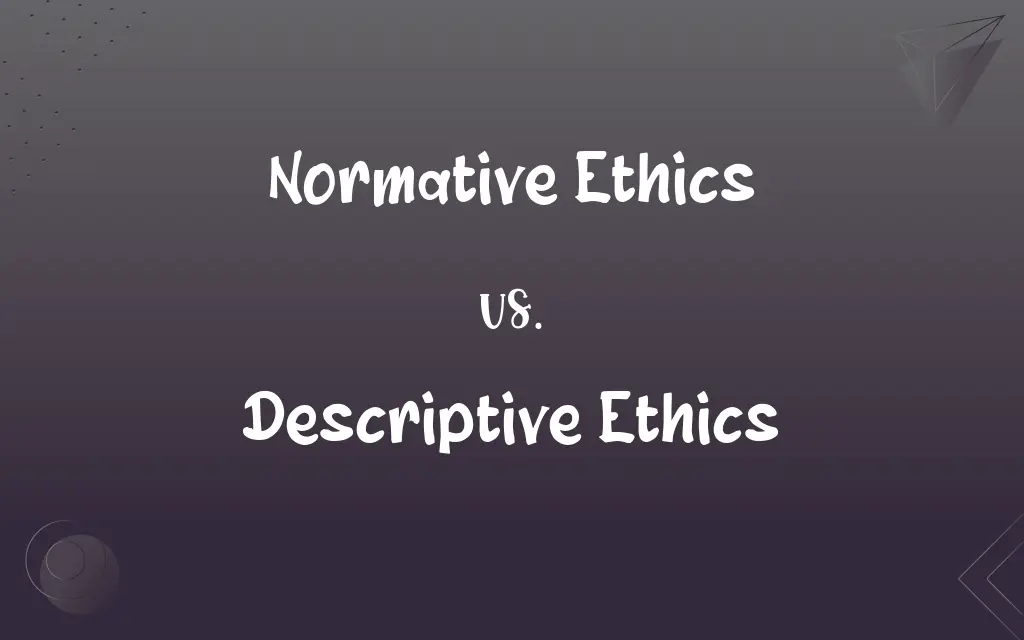Normative Ethics vs. Descriptive Ethics: What's the Difference?
Edited by Aimie Carlson || By Harlon Moss || Published on November 29, 2023
Normative ethics prescribes moral standards; descriptive ethics observes and describes moral behavior and beliefs.

Key Differences
Normative ethics involves developing theories about what is right and wrong, guiding moral behavior. Descriptive ethics, in contrast, is the scientific study of moral beliefs and practices, focusing on what people believe to be right and wrong.
The goal of normative ethics is to set moral standards and rules that ought to be followed. Descriptive ethics, however, aims to understand and describe moral behavior as it occurs in reality, without prescribing any standards.
Normative ethics debates moral principles like justice, rights, and welfare, seeking to establish ethical guidelines. Descriptive ethics, on the other hand, examines the ethical beliefs and practices of different cultures and societies.
In normative ethics, philosophers argue about what moral actions people should take in various situations. Descriptive ethics, conversely, analyzes how people actually behave in moral situations and the factors influencing these behaviors.
Normative ethics often involves creating theories like utilitarianism or deontology. Descriptive ethics involves empirical research into people's ethical beliefs, often using methodologies from social sciences.
ADVERTISEMENT
Comparison Chart
Purpose
To prescribe moral standards and principles
To observe and describe moral behavior
Focus
What should be done ethically
What is actually done ethically
Methodology
Philosophical argument and reasoning
Empirical research and observation
Application
Developing ethical theories and guidelines
Studying real-world moral beliefs and practices
Examples of Questions Addressed
"What is the right thing to do?"
"What do people believe is right?"
ADVERTISEMENT
Normative Ethics and Descriptive Ethics Definitions
Normative Ethics
Normative ethics seeks to establish universal moral principles.
A normative ethicist might argue that human rights should be upheld in all societies.
Descriptive Ethics
Descriptive ethics focuses on how people behave and what moral standards they follow.
Through descriptive ethics, researchers found diverse attitudes towards animal rights across cultures.
Normative Ethics
Normative ethics includes theories like utilitarianism, which judges actions by their consequences.
A normative ethicist might use utilitarianism to evaluate the ethics of environmental policies.
Descriptive Ethics
Descriptive ethics is the study of people's beliefs about morality.
Descriptive ethics would examine why people in different cultures have varying views on polygamy.
Normative Ethics
It involves creating moral standards that guide behavior.
Normative ethics debates whether stealing for survival is ethically justifiable.
Descriptive Ethics
This branch uses social science methods to understand ethical views.
A descriptive ethics study might survey public opinions on physician-assisted suicide.
Normative Ethics
Normative ethics is the study of ethical action and defines how things should be done morally.
Normative ethics would question whether lying is ever morally acceptable.
Descriptive Ethics
It observes and analyzes actual moral behaviors and practices.
Descriptive ethics investigates why some societies accept bribery as a norm.
Normative Ethics
This branch of ethics evaluates actions based on moral criteria.
In normative ethics, the morality of capital punishment is a subject of rigorous debate.
Descriptive Ethics
Descriptive ethics does not prescribe moral rules but describes moral phenomena.
Descriptive ethics could explore the varying moral perspectives on climate change.
FAQs
What are some examples of normative ethical theories?
Examples include utilitarianism, deontology, and virtue ethics.
What is normative ethics?
Normative ethics studies ethical action, focusing on the criteria for what is right or wrong.
Is normative ethics subjective or objective?
It can be both, depending on the theory. Some argue for objective moral truths, while others see it as subjective.
How is normative ethics applied in real life?
It's used in making moral judgments and establishing laws and social policies.
How does normative ethics differ from descriptive ethics?
Normative ethics prescribes ethical standards, while descriptive ethics describes how people behave and what moral standards they claim to follow.
Do all philosophers agree on a single approach to normative ethics?
No, there are diverse and sometimes conflicting approaches within normative ethics.
What is descriptive ethics?
Descriptive ethics involves studying and describing people's moral beliefs and behaviors.
Can descriptive ethics help in understanding cultural differences in morality?
Yes, it provides insights into how moral standards vary across cultures.
Is descriptive ethics a form of moral relativism?
Not necessarily. It describes moral beliefs without making judgments about them.
Can normative ethics change over time?
Yes, as it is influenced by cultural, social, and personal factors.
Why is normative ethics important?
It guides moral decision-making and ethical behavior in society.
Can descriptive ethics predict future moral trends?
It can offer insights, but predictions are not always accurate due to the dynamic nature of societies.
Does descriptive ethics influence lawmaking?
It can inform lawmakers about societal values and norms.
How does descriptive ethics interact with normative ethics?
Descriptive ethics provides data that can be used to inform or challenge normative ethical theories.
Can normative ethics provide absolute answers?
Not always, as it often involves interpretation and weighing of different ethical principles.
How does religion influence normative ethics?
Religious beliefs often shape an individual's or society's ethical standards.
How is descriptive ethics used in academia?
It's used in social sciences to understand how ethical decisions are made in different societies.
Can descriptive ethics be biased?
Yes, researchers' biases can influence how they interpret and present their findings.
How does descriptive ethics gather its data?
Through surveys, anthropological fieldwork, historical analysis, and psychological studies.
Is descriptive ethics concerned with what ought to be?
No, it focuses on what is, rather than what ought to be.
About Author
Written by
Harlon MossHarlon is a seasoned quality moderator and accomplished content writer for Difference Wiki. An alumnus of the prestigious University of California, he earned his degree in Computer Science. Leveraging his academic background, Harlon brings a meticulous and informed perspective to his work, ensuring content accuracy and excellence.
Edited by
Aimie CarlsonAimie Carlson, holding a master's degree in English literature, is a fervent English language enthusiast. She lends her writing talents to Difference Wiki, a prominent website that specializes in comparisons, offering readers insightful analyses that both captivate and inform.































































